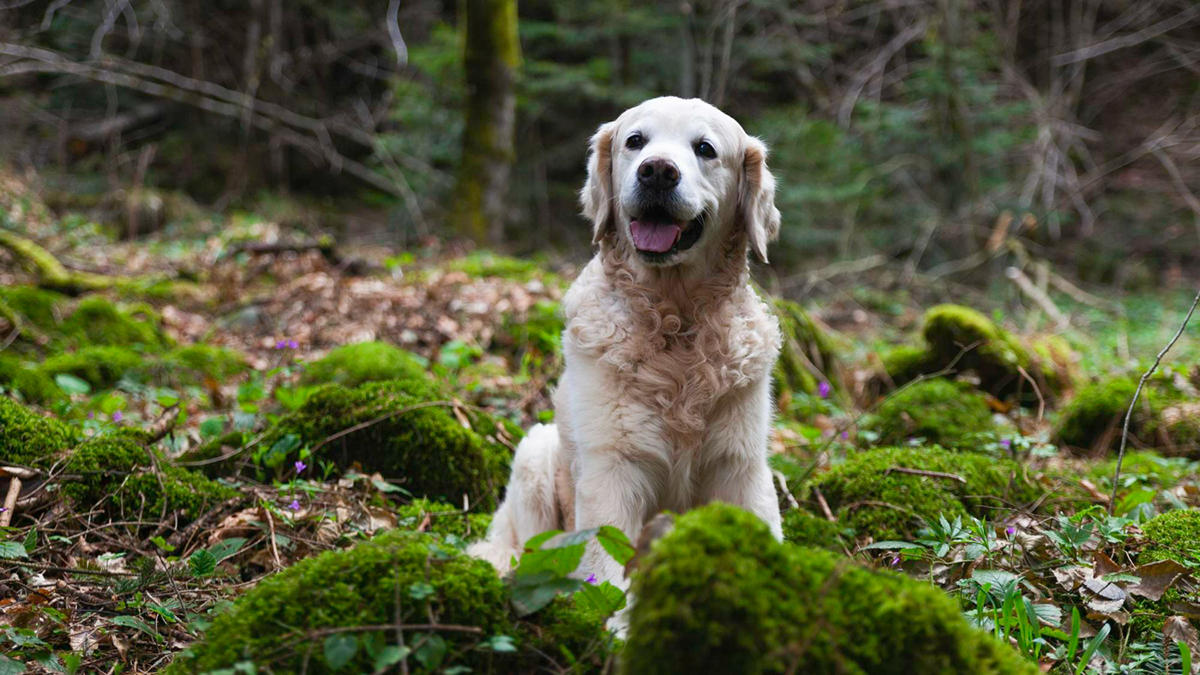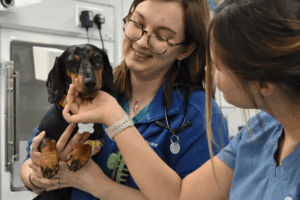It’s no secret that dogs are curious and can get tempted to lick and chew plants and trees wherever they go. But some plants are particularly harmful to dogs and need to be avoided.
To help keep your dogs safe, we’ve put together a handy guide to harmful plants and what you should do if dog eats one of them.
Symptoms of plant poisoning in dogs
It’s always worrying if your dog is showing signs of becoming unwell. In most cases, digesting plants will only cause mild symptoms, but some plants are dangerous, especially if your dog eats large quantities in a short space of time.
Here are some key symptoms of plant poisoning look out for:
- Low energy
- Drooling
- Drinking or urinating more
- Eating less or not eating
- Agitation
- Vomiting
- Diarrhoea
- Rashes
- Red skin
- Mouth ulcers
- Pale gums
- Changes in heart rate (faster or slower)
- Changes in body temperature
- Blood in stools
- Weakness
- Twitching or seizures
- Struggling to breathe
- Collapse
- Extreme sedation
- Coma
If your dog is showing symptoms of plant poisoning, seek veterinary help as soon as possible.
Toxic plants
Not all parts of plants are toxic, for some it’s only the bulbs or berries that will cause problems. But it’s better to keep your dog away from the whole plant to be safe.
The below list is not exhaustive, but covers a wide range of plants to stay clear of.
- Amaryllis (bulbs) (Hippeastrum species): Can be fatal, causing lethargy, upset stomach, coma and shock.
- Asparagus fern (Asparagus setaceus): Contains a wide variety of poisons resulting in a large range of symptoms.
- Autumn crocus (Colchicum autumnale): Can cause vomiting, nervous excitement and dermatitis.
- Azalea (Rhododendron occidentale): Can be fatal if eaten in large quantities, causing diarrhoea, depression, difficulty breathing and coma.
- Bluebells (Hyacinthoides): Can affect the dog’s heart if large quantities are eaten, causing the heartbeat to slow or increase. Some dogs may experience sickness, stomach pains or have an upset stomach, which may contain streaks of blood.
- Cyclamen (Cyclamen species): Can affect the gastrointestinal tract and cause convulsions and paralysis.
- Daffodils (Narcissus species): Can cause salivation, upset stomach, vomiting and collapsing. In more serious cases, it causes fits and changes to heart rate, body temperature and blood pressure. Dogs can also become unwell if they drink water from a vase containing daffodils.
- Deadly Nightshade (Atropa belladonna, Solanum dulcamara and related species): Can be fatal and cause digestive issues.
- Delphinium (seeds, young plants) (Delphinium species): Harmful if eaten in quantity.
- Foxgloves (leaves, seeds) (Digitalis species): Toxic if eaten, causing nausea and vomiting.
- Geranium (Pelargonium species): Can cause vomiting, reduced appetite, depression and irritated skin.
- Giant Hogweed (Heracleum mantegazzianum): Can cause serious problems in both pets and humans, including skin burns and blisters. It’s important to seek medical advice if you or your pet has come into contact with giant hogweed.
- Grape vines (Vitis vinifera): Grapes can be highly toxic to dogs.
- Heavenly bamboo (Nandina domestica): Can be fatal if sufficient quantities of its bright red berries are ingested.
- Hemlock (Tsuga species): Can be fatal, symptoms include: difficulty breathing, seizures, drooling, cardiac abnormalities, agitation and twitching.
- Holly (berries) (Ilex aquifolium): Causes upset stomach, tremors, seizures and loss of balance.
- Horse chestnut (nuts and leaves) (Aesculus hippocastanum): Harmful if large quantities are eaten. Chestnuts can cause stomach problems or a gut blockage.
- Hyacinth (bulbs) (Hyacinthus orientalis): Harmful if eaten in quantity, can cause a skin allergy.
- Hydrangea (Hydrangea species): Can cause vomiting, diarrhoea, lethargy and confusion.
- Ivy (Hedera helix): The entire plant is harmful when eaten in large quantities.
- Laburnum (leaves and seeds) (Laburnum anagyroides): Toxic when eaten, causing nausea and vomiting.
- Laurel (including Cherry Laurel (Prunus laurocerasus) and other laurel species): Harmful if large quantities are eaten.
- Lilies (Lilium species): Harmful if eaten in quantity.
- Lily of the valley (leaves, flowers and roots) (Convallaria majalis): Toxic if eaten, causing nausea and vomiting.
- Lupins (leaves and seeds) (Lupinus species): Harmful when lots is eaten.
- Mistletoe (berries) (Phoradendron flavescens): Affects dog’s gastrointestinal tract and may cause dermatitis. It can be fatal for puppies who eat a few berries.
- Morning glory (seeds and roots) (Ipomea species): Harmful when vast amounts are consumed.
- Mushrooms/Fungi (Many species): Some types of fungi can be fatal, causing abnormal heart rhythms, fits or organ failure, others can cause diarrhoea and vomiting. Identifying mushrooms can be difficult, so we advise you to stop your dog from eating any mushrooms.
- Oak (foliage and acorns) (Quercus pedunculata): Can affect the kidneys. Acorns can cause stomach problems or a gut blockage.
- Oleander (Nerium oleander): Is extremely poisonous and can be fatal. It affects the heart and digestive system, and may cause dermatitis.
- Onions and garlic plants (Allium species): All parts of the plant, especially the bulbs, can be toxic and cause anaemia. Onions should not be fed to dogs in any form.
- Poison Ivy (leaves, bark and fruit) (Toxicodendron radicans): Is poisonous and can cause severe blistering dermatitis when it comes into contact with the skin.
- Potato plant (Solanum tuberosum): The leaves on potatoes can be toxic. Raw, green or sprouting potatoes can also be harmful.
- Ragwort (Senecio Jacobaea): Minute doses can be fatal, causing irreversible kidney failure and liver damage.
- Rape (Brassicus napus): Can cause anaemia, blindness, damage to the nervous system, digestive system and breathing problems.
- Rhododendron (Rhododendron species): Can be fatal, causing nausea, vomiting, difficulty breathing and coma.
- Rhubarb (Rheum rhabarbarum): Can be fatal, rhubarb leaves are poisonous whether they are cooked or raw and can cause convulsions and coma.
- Rowan (Sorbus aucuparia): Can cause excess saliva, vomiting and diarrhoea.
- Snowdrops (Galanthus species): Can cause vomiting and diarrhoea, or if large amounts are consumed, slow heart rates and fits.
- Sweet pea (Lathyrus odoratus): Harmful if eaten in quantity.
- Tomato (green fruit, stem and leaves) (Solanum lycopersicum): Leaves and unripe fruit on tomato plants can cause vomiting, diarrhoea, drowsiness and abnormal heart rate.
- Tulips (Tulipa species): Can cause drooling, vomiting and diarrhoea. Serious cases are rare, but symptoms could include heart problems and breathing difficulties
- Wisteria (pods and seeds) (Wisteria): Can cause nausea, repeated vomiting, stomach pains, severe diarrhoea, dehydration and collapse.
- Yew (berries and foliage) (Taxus baccata and related species): Can be fatal, symptoms include dizziness, dry mouth, abdominal cramps, salivation and vomiting. Foliage is more fatal than berries, death can be sudden without warning or symptoms.
Tips for preventing plant poisoning
To help keep your dog safe at home, fence off the areas where you keep your plants and keep poisonous plants out of your dog’s reach. Or even better, remove toxic plants from your garden entirely and use non-toxic or artificial plants instead.
If you know there are certain dog walk routes where there are lots of poisonous plants, it’s best to avoid them and take another.
What to do if your dog eats something it shouldn’t
If your dog eats or chews a poisonous plant, you should call your vet immediately and take them in as soon as possible. You don’t need to wait for your dog to become unwell.
If you’re not sure what your dog has eaten, call your vet for advice.
It’s useful to pick a sample of what has been eaten so it can be identified later. Just make sure to package it carefully and wash your hands, as it could be toxic to humans too.
If you have any concerns about your pet, please get in touch with your local St Kitts practice.
St Kitts Veterinary Centre: 01252 844044
Basingstoke Veterinary Centre: 01256 844944
Crookham Park Veterinary Centre: 01252 913990
Firgrove Veterinary Centre: 01252 877799





